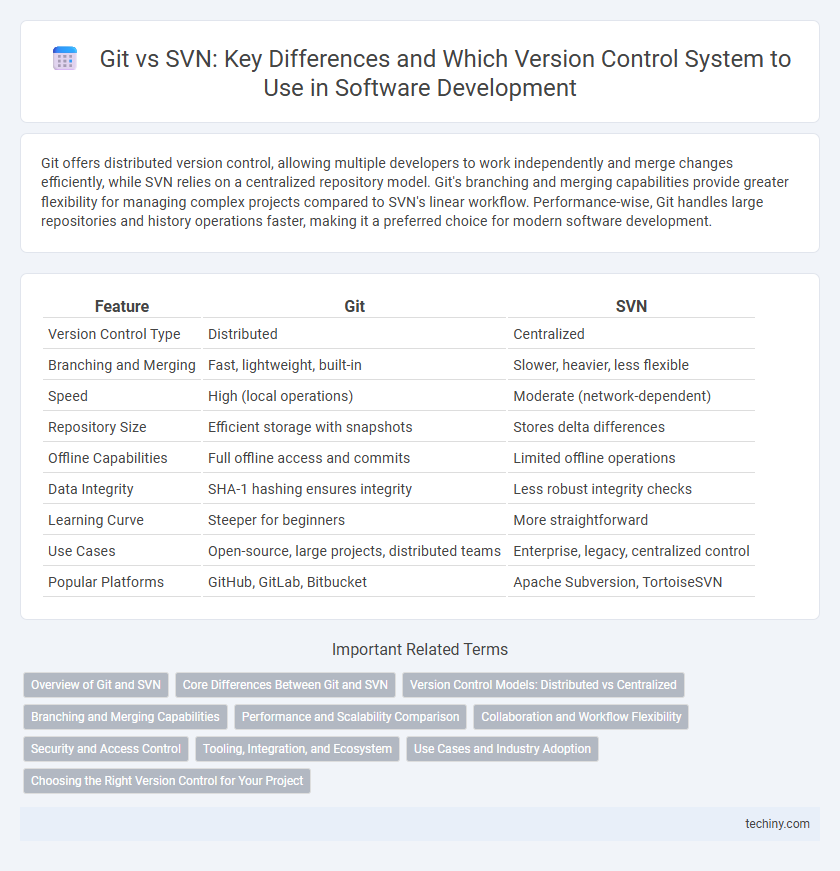Git offers distributed version control, allowing multiple developers to work independently and merge changes efficiently, while SVN relies on a centralized repository model. Git's branching and merging capabilities provide greater flexibility for managing complex projects compared to SVN's linear workflow. Performance-wise, Git handles large repositories and history operations faster, making it a preferred choice for modern software development.
Table of Comparison
| Feature | Git | SVN |
|---|---|---|
| Version Control Type | Distributed | Centralized |
| Branching and Merging | Fast, lightweight, built-in | Slower, heavier, less flexible |
| Speed | High (local operations) | Moderate (network-dependent) |
| Repository Size | Efficient storage with snapshots | Stores delta differences |
| Offline Capabilities | Full offline access and commits | Limited offline operations |
| Data Integrity | SHA-1 hashing ensures integrity | Less robust integrity checks |
| Learning Curve | Steeper for beginners | More straightforward |
| Use Cases | Open-source, large projects, distributed teams | Enterprise, legacy, centralized control |
| Popular Platforms | GitHub, GitLab, Bitbucket | Apache Subversion, TortoiseSVN |
Overview of Git and SVN
Git is a distributed version control system that allows multiple developers to work concurrently by maintaining local repositories, enabling faster commits, branching, and merging with minimal dependency on a central server. SVN (Apache Subversion) is a centralized version control system that manages files and directories over time by maintaining a single central repository, which simplifies access control and version tracking but may introduce latency in collaborative workflows. Both systems track changes and support collaborative software development, but Git's distributed architecture offers enhanced flexibility, while SVN provides straightforward centralized management for projects requiring strict repository control.
Core Differences Between Git and SVN
Git utilizes a distributed version control system where each developer has a complete local copy of the repository, enabling offline work and faster commits, while SVN relies on a centralized version control model dependent on a single server. Git excels in branching and merging due to its lightweight branches and powerful merging algorithms, whereas SVN employs heavier branches that can complicate parallel development workflows. Additionally, Git stores data as snapshots of the entire project state, improving data integrity and history traversal, whereas SVN records changes as differences or deltas between file versions.
Version Control Models: Distributed vs Centralized
Git employs a distributed version control model, enabling every developer to maintain a complete local repository, which enhances collaboration and offline work capabilities. SVN uses a centralized version control model, relying on a single central server to store the version history, which simplifies access control but can create a single point of failure. Distributed systems like Git facilitate branching and merging more efficiently, while centralized systems like SVN offer straightforward control and easier backup management.
Branching and Merging Capabilities
Git offers advanced branching and merging capabilities with lightweight branches that enable developers to create, switch, and merge branches quickly and efficiently within distributed repositories. SVN uses centralized version control with heavier branches that can lead to slower performance and more complex merges, especially in large-scale projects. Git's powerful merge algorithms reduce conflicts and provide more granular control, making it ideal for collaborative and parallel development workflows.
Performance and Scalability Comparison
Git offers superior performance and scalability compared to SVN due to its distributed architecture, enabling faster local operations and reduced server dependency. SVN relies on a centralized model that can create bottlenecks in large-scale projects, whereas Git efficiently manages extensive repositories with numerous branches and contributors. Consequently, Git remains the preferred choice for high-performance, scalable version control in modern software development.
Collaboration and Workflow Flexibility
Git offers superior collaboration through its distributed version control system, enabling multiple developers to work concurrently without dependency on a central server. Its branching and merging capabilities provide greater workflow flexibility, allowing teams to experiment, isolate features, and integrate changes seamlessly. SVN, while centralized and simpler to manage, limits collaborative agility and branching functionality compared to Git's decentralized model.
Security and Access Control
Git offers enhanced security features through cryptographic integrity checks using SHA-1 hashing, ensuring committed data cannot be tampered with, whereas SVN relies on less robust file-based checksums. Access control in SVN is typically more granular, allowing directory-level permissions enforceable via server-side hooks, while Git's access control requires external tools like GitHub or GitLab to manage repository-level permissions effectively. Enterprises favor Git for its immutable commit history and distributed model that enhances security, but SVN remains preferred where strict access control on specific project parts is critical.
Tooling, Integration, and Ecosystem
Git offers a robust ecosystem with extensive tooling and seamless integration capabilities across numerous CI/CD platforms, enhancing development workflows and collaboration. SVN's tooling ecosystem is more limited, primarily catering to centralized version control needs, and integrates well with legacy enterprise systems but lacks the flexibility of Git in modern DevOps environments. Git's widespread adoption supports a vibrant community and abundant third-party tools, making it the preferred choice for distributed version control in complex software development projects.
Use Cases and Industry Adoption
Git excels in distributed version control, making it ideal for large-scale, open-source projects and teams requiring offline work capabilities, while SVN's centralized model suits enterprises needing strict access controls and simpler workflows. Industry adoption heavily favors Git, with platforms like GitHub and GitLab driving widespread usage among developers, whereas SVN remains prevalent in legacy systems and industries with regulatory compliance demands. The choice between Git and SVN often depends on project complexity, team size, and integration requirements within the software development lifecycle.
Choosing the Right Version Control for Your Project
Choosing between Git and SVN depends on your project's needs for branching, collaboration, and history tracking. Git offers distributed version control with robust branching and merging capabilities, ideal for collaborative and large-scale projects requiring offline work. SVN provides centralized version control, simplifying access control and versioning for projects that need straightforward repository management and linear development history.
Git vs SVN Infographic

 techiny.com
techiny.com